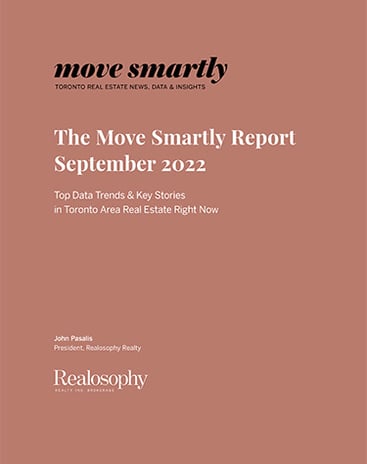Rising rents are keeping investors optimistic - for now.
As Featured in the monthly Move Smartly Report for September 2022 - watch video above or on our Move Smartly YouTube channel here; read story below and go to report to read all stories for the month.
FREE PUBLIC WEBINAR: The Market Now with John Pasalis
Join John Pasalis, report author, leading market analyst and Move Smartly contributor, and President of Realosophy Realty, and in a free monthly webinar as he discusses key highlights this month's report and answers your questions. A must see for well-informed Toronto area real estate consumers.
Register now to get recording of latest session and access to future sessions.
Housing markets that have a high share of real estate investors are often more vulnerable to a sharp decline in prices when the market slows down as it recently has in the Toronto area because investors tend to be more willing to sell and exit the market than end-users or owner-occupiers (i.e., those who live in their homes) are. Investors are typically the first ones to exit when the housing market begins to cool because unlike owner-occupiers, they are less attached to their properties and approach selling as a business decision rather than a personal decision to uproot oneself and one’s family.
We saw this occur in the real estate bubble years preceding the 2008 US financial crisis when the states that had the highest share of investors buying homes saw the biggest decline in house prices.
More recently, we saw this dynamic unfold in Toronto’s condo market, which has a high share of units owned by investors. During the first year of the COVID-19 pandemic, falling prices and rents resulted in a surge in condo listings and in my April 2021 report, I showed that an increase in the share of investors selling was a large part of the story.
But if that’s the case, why aren’t investors rushing to sell now as the market cools?
This time around, a very strong rental market with rapidly rising rents has helped keep investors optimistic about their investments. In 2020, when investors rushed to sell, prices and rents were trending down which made many investors very pessimistic. Today, only prices are trending down and condo prices are actually holding up better than low-rise prices. Condo rents, on the other hand, are up 20% in Toronto hitting a record average of $2,806 in August according to research firm Urbanation, making investors optimistic about the future path of home prices and rents.
Now, we are likely only past the first phase of potential investor action — in the early stages of a downturn, investors exit when they believe prices will be lower in the future and want to avoid future declines.
In the later stages of a housing cycle, some investors exit the market due to financial distress.
The more leveraged an investor is, the more sensitive and vulnerable they are during periods of rapidly rising interest rates. If investors are unable to afford their higher debt payments once their mortgage comes up for renewal, they may decide to unload one or more of their properties to reduce their debt load. We have yet to see investors exiting in any significant numbers because most have not felt the impact of today’s higher rates on their debt payments yet but this may gradually change.
In the case of investors who bought pre-construction houses and condos with down payments, there’s a chance that some of them won’t be able to qualify for a mortgage at current rates to actually take possession of the property. We are seeing early signs of distress among these investors who are eager to ‘assign’ or ‘flip’ the contracts for these properties (i.e., sell to another buyer) before they have to close and take possession of the property. Many are willing to take a financial loss on the transaction to avoid defaulting on their purchase, but the appetite from buyers for assignment sales is very low at present.
I’ll expand on these dynamics in the pre-construction market in a future report.
Top Image Credit: Getty/iStock
The Move Smartly monthly report is powered by Realosophy Realty Inc. Brokerage, an innovative residential real estate brokerage in Toronto. A leader in real estate analytics, Realosophy educates consumers at Realosophy.com and MoveSmartly.com and helps clients make better decisions when buying and selling a home.
John Pasalis is President of Realosophy Realty. A specialist in real estate data analysis, John’s research focuses on unlocking micro trends in the Greater Toronto Area real estate market. His research has been utilized by the Bank of Canada, the Canadian Mortgage and Housing Corporation (CMHC) and the International Monetary Fund (IMF).




.jpg?width=600&name=Public%20Webinar%20Social%20%E2%80%93%20Sept%202022_MoveSmartly_%20600x300%20(1).jpg)
